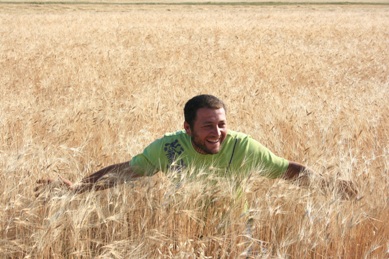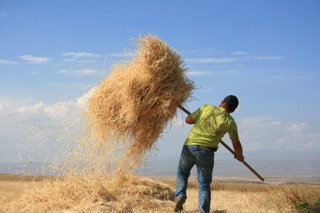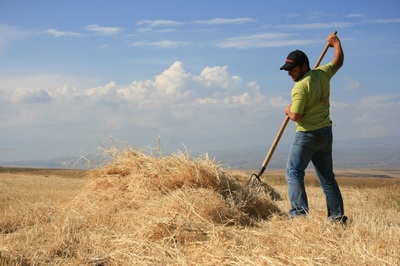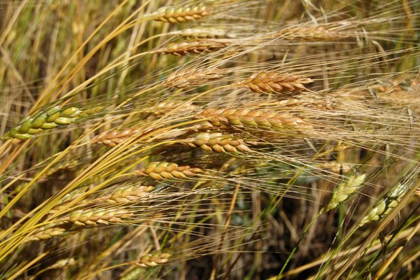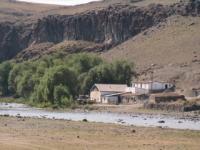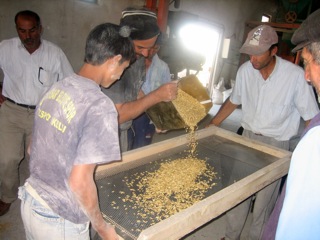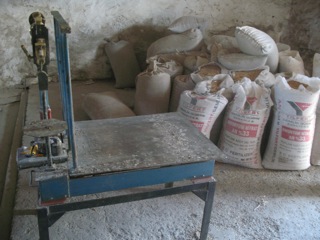REVIVAL OF LOCAL CROPS
The Foundation's agricultural project aimed to revive and propagate the disappearing traditional crops. These well-adapted plants to the region's soil can be crucial for sustenance in the face of dramatic climate change. They can also provide a good source of income to local families as marketable organic products.
In 2007, the project team introduced an 'Organic Certification Program' to traditional farmers from seven villages in partnership with a third-party organic certifying agency. Villages were selected for their importance to biodiversity, conservation and ecotourism. Initially, 180 farmers signed up for the program. Today, the once-disappearing crops are propagated in the region and many farmers continue to farm organically. The project also inspired public awareness of heritage seed protection in the country.
WE BROUGHT BACK THE ENDANGERED ANCIENT GRAIN EMMER!!
KAVILCA/ EMMER
Triticum dicoccum
This regional nutritious grain, a relative of einkorn and spelt, was rapidly heading toward extinction. Kavılca (ka-veel-cja) is the local name for emmer, one of the earliest domesticated wild wheat varieties known to humanity. Traces of wild emmer were found in archeological excavations of Neolithic settlements in Anatolia. At the beginning of the project, emmer was grown only in small pockets along the countryside and mostly used as fodder. It has now re-established itself as an important food crop in the region.
Emmer survived mainly because a few families consumed it as a gourmet pilaf dish, served with tandoor-cooked goose meat. Project farmers showed great interest in reviving this ancient grain. The project team distributed them 2MT of emmer seed found after searching up to 30 villages. Nowadays, emmer is once again a staple grain in the region. It is sold as organic emmer flour nationwide. Besides being a rich source of complex carbohydrates, emmer adds fiber to the local diet known in high in meat consumption. It is low in gluten and may be tried by those who are wheat intolerant. It is not recommended for those with celiac disease.
Emmer became endangered as it was difficult to separate the primitive double-kernel grain from its husk. Traditionally it was cracked, sifted, and hand-sorted at the local watermill. Modern equipment is needed to obtain the intact whole grain for wider production and distribution. Recently, a local miller installed equipment in his facility to open up a limited marketplace for emmer products. Investment is needed to establish a more sophisticated production facility to ensure the sustainability of the project. Growing emmer can become an income source for rural families, at the same time helping to conserve the agro-biodiversity of the region..
Please contact us for more information.
Emmer survived mainly because a few families consumed it as a gourmet pilaf dish, served with tandoor-cooked goose meat. Project farmers showed great interest in reviving this ancient grain. The project team distributed them 2MT of emmer seed found after searching up to 30 villages. Nowadays, emmer is once again a staple grain in the region. It is sold as organic emmer flour nationwide. Besides being a rich source of complex carbohydrates, emmer adds fiber to the local diet known in high in meat consumption. It is low in gluten and may be tried by those who are wheat intolerant. It is not recommended for those with celiac disease.
Emmer became endangered as it was difficult to separate the primitive double-kernel grain from its husk. Traditionally it was cracked, sifted, and hand-sorted at the local watermill. Modern equipment is needed to obtain the intact whole grain for wider production and distribution. Recently, a local miller installed equipment in his facility to open up a limited marketplace for emmer products. Investment is needed to establish a more sophisticated production facility to ensure the sustainability of the project. Growing emmer can become an income source for rural families, at the same time helping to conserve the agro-biodiversity of the region..
Please contact us for more information.
Traditional water mill processes local grains, cracked emmer and emmer flour.

